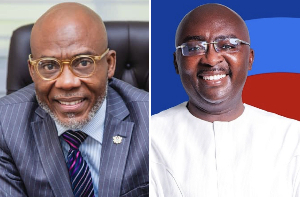Perusing the list of the former presidents of Ghana, I found no name there as KUFFOUR. As embossed in Wikipedia, the second President of the Fourth Republic of Ghana is John Agyekum Kofi KUFUOR. Notice the spelling properly: it’s one ‘f’ and the ‘u’ comes before the ‘o’.
To digress a bit, I draw my colleagues’ (teachers’) attention to this: the letter ‘f’ is correctly written as an ascender, ie, no part of the letter enters the line below it. Look at these words: ‘going’, ‘you’ and ‘fulfil’. What have you noticed? Whilst the ‘tails’ of ‘g’ and ‘y’ extend into the line below, ‘f’ appears entirely on the same line. The common mistake is for teachers to teach pupils to pull the portion below the cross on ‘f’ across the next line. Avoid!
Returning to our problem, we observe that names are words given to people to identify them. One name may, however, be given to several persons. Consequently, numerous ways exist to identify the same name given to different persons. For example, one name may have different spellings (eg, my name, Idris, may also be spelt Iddris, Iddrisu, Iddrissu or Iddrissou). Knowing all these spellings gives no right to anybody else to write my name as any of the other forms. This principle applies to everyday English words in which one letter often changes one word into another (eg, précis & precise, liter & litter and stoping & stopping).
I write this article in response to the persistent and tiresome misspelling of the name KUFUOR, which refers to the immediate ex-president of Ghana. Because the media houses in Ghana test positive to infesting their reportage with unpardonable grammatical errors, they (the journalists and media houses) recognize no legal implication of writing somebody else’s name ANYHOW. But common sense suggests that this careless writing needn’t be extended to cover the names of the first gentlemen of the nation.
As far back as 2007, the first of such unsightly write-ups was seen in Modernghana news (http://www.modernghana.com @ 13/03/2007) and the headline was ‘President Kuffour visits the Queen’. And I think since then, this problem no longer exists. It resurfaced but this time on a more dangerous note.
The awfulness of this error becomes extreme when the writers themselves are people with strong NPP background and affiliation; this group of people would have been the last to misspell the name that represents their party in the history of Ghana’s Fourth Republic. And the mistake is often seen in either the headline or the first paragraph. Why?
One of such NPP groups to have committed this error is the NPP branch in UK. On their own webpage (newpatrioticparty.org.uk @ 26/05/2014), NPP UK, writing under the heading ‘About the NPP’ gave three different spellings of the name. In the subheading, ‘Kuffour’ is embossed; in Line 1 of Paragraph 1, ‘Kufour’ is boldly written and finally, in Line 4 of Paragraph 2, ‘Kufuor’ is found there. Which of these is the name of our ex-president? Throughout the said webpage, these three different spellings are used interchangeably as if they are synonyms. Why?
Just this May 2014, two articles both written to praise the ex-president never recognized the correct spelling of his name. The first one ‘President Kuffour Was Right in Selling GT’ (@ ghanaweb 24/05/2014) was written by Justice Sarpong. Whilst not drawing myself into his argument, I wondered why Justice misspelt the name of the ex-president he adored and intended to share his (Kufuor) achievements with us.
Justice wrote his article in response to an interview granted to Mr Kufuor by Peace FM in which the ex-president reportedly said he was right to sell Ghana Telecom. The funniest aspect is that Justice quoted one statement reportedly made by the ex-president. This statement, taken verbatim from Justice’s write-up, is reproduced here:
"I'll sell it a hundred times [and] I will do it again for Ghana if given the opportunity...not for me [Kufuor] but for Ghana". President KUFFOUR stated.
Despite, seeing the correct name written in this statement, Justice carelessly maintained ‘KUFFOUR’ both in his title and in his statement introducing the quotation. Hmm!
Still embarking on our misspelling voyage, we look at another article ‘Let’s appreciate what our predecessors have done for Mother Ghana’(@ghanaweb 26/5/2014) posted by Michael Kessey. Reproduced here is a statement from the aforementioned article: ‘Former President John Agyekum KUFFOUR and his administration for the love of mother Ghana took the initiative of taking Ghana to HIPC….’
Michael’s article, padded with so many grammatical errors, also seeks to praise Mr Kufuor for achieving heights for Ghana. If indeed he admires the ex-president and wants us to appreciate what he (Mr Kufuor) did, he should have written ‘KUFUOR’ instead of KUFFOUR. Because if one goes into our archives, one may be able to confirm the said achievements listed under President KUFUOR. There is no KUFFOUR in the list of Ghana’s presidents.
What is the obvious source of this spelling problem? —Failure to look at a word from the beginning to the end before writing or pronouncing it. Ghana had a former footballer known as Samuel Osei KUFFOUR. Perhaps, the popularity of his name misled many journalists and teachers into concluding incorrectly that every Akan name beginning with ‘KUF’ must end in ‘FOUR’. Why?
I’m not an Akan, but I guess ‘Kuffour’ and ‘Kufuor’ might differ in pronunciation and/or meaning. Correct as necessary! Even if both names mean the same, it’s morally and legally unacceptable for one person to use them interchangeably. To the best of my knowledge, the ex-president had never written his name as KUFFOUR before and will never do that. Thus, our immediate past president is Mr KUFUOR and not Mr KUFFOUR.
We thought that in this IT age with media plurality, our work as teachers would be simplified. Rather it’s being complicated. For example, for every keyword, we must first ‘force’ students to unlearn the wrong before they learn the correct one. I used these words to test and confirm this unlearn-before-learn principle: air freshener, air conditioner and creche. Except those students whose performance is below average, all the good to excellent students in JHS 2 mispronounced them as /air fresher/, /air condition/ and /crech/ respectively.
But what is the cause of these wrong and weird pronunciations? Students come from market homes where hawkers called ‘air freshener’ as ‘air fresher’. How on earth can something fresh the air? (Air freshener is the substance, both solids and liquids, used in rooms to give fresh scent; air freshener is therefore used to freshen the air). In the second word, many people repairing the device that conditions air in rooms write on the fascia of their workshop as AIR CONDITION REPAIRER instead of AIR CONDITIONER REPAIRER. Lastly, nearly all proprietors of preschools say /crech/ instead of /cresh/. How should we expect students/pupils from such homes to come to school to pronounce these words correctly?
Try this test in your school and you may get similar results. For my written test that uses ‘diary’, loin’ and ‘gaol’/jail/, 99 % of the students rewrote ‘dairy’, ‘lion’ and ‘goal’ in much the same way as people are writing KUFFOUR instead of KUFUOR. Again Why? People will no longer painstakingly look at a word from the beginning to the end before rewriting or pronouncing it. And this is the root cause of our teaching problem (eg, most students and authors will write lightening for lightning).
Michael’s article contained another careless orthographic mistake: bonafide [sic]. This sloppy mistake is writing a Latin modifier as a solid word (a solid word is a compound word that has no space or hyphen between the parts, eg, semiconductor and micronutrient). The word ‘bona fide’, typical of other Latin modifiers such as ‘sine die’ and ‘de factor’, comprises two separate parts. If typed on a computer as one word, ‘bona fide’ /pronounced bonafaidi/ will be underlined with a red wavy line. Why not cross-check before ignoring? This is the reason that I call these as careless errors.
Never hesitate in dropping a comment, for I stand by to receive and to respond to them where appropriate. Appreciate this, part of the Generational Error Series? Thank a teacher.
Long live teachers! Long live Kwame Nkrumah’s Ghana!
Idris Pacas: +233 20 91 01 53 3
Opinions of Thursday, 29 May 2014
Columnist: Pacas, Idris














